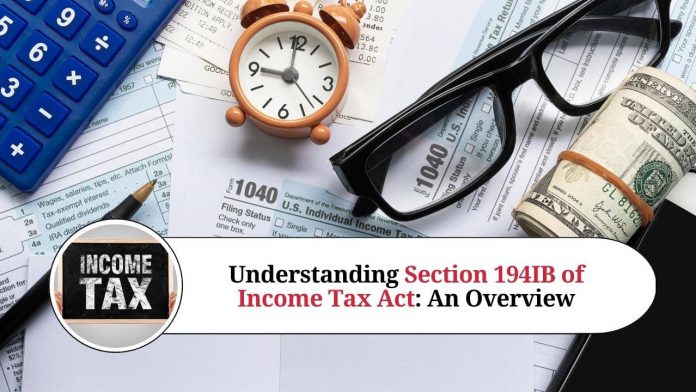The Indian government imposes various taxes on the income earned by individuals and businesses. One such tax is the income tax, which is governed by the Income Tax Act, 1961. Under this act, several sections impose taxes on different types of income. One such section is Section 194IB, which is applicable to individuals who are tenants and pay rent to a resident landlord.
Applicability of Section 194IB
Section 194IB of the Income Tax Act is applicable to individuals who are tenants and paying rent to a resident landlord. The section applies to individuals who are not required to get their accounts audited under Section 44AB of the Act. However, it does not apply to individuals who are paying rent for personal use.
TDS Under Section 194IB
Under Section 194IB of the Income Tax Act, tenants are required to deduct TDS (Tax Deducted at Source) on the rent paid to a resident landlord. The TDS rate under this section is 5% of the rent paid or credited to the landlord. If the landlord has not provided a Permanent Account Number (PAN) to the tenant, then the TDS rate under this section will be 20%.
Threshold Limit for TDS under Section 194IB
The threshold limit for TDS under Section 194IB of the Income Tax Act is Rs. 50,000 per month. This means that if the monthly rent paid or credited to the landlord is less than or equal to Rs. 50,000, then the tenant is not required to deduct TDS under this section. However, if the monthly rent exceeds Rs. 50,000, then the tenant is required to deduct TDS at the rate of 5%.
Compliance Requirements Under Section 194IB
As per the compliance requirements under Section 194IB of the Income Tax Act, tenants are required to obtain a Tax Deduction Account Number (TAN) and deduct TDS on the rent paid to the landlord. The tenant is also required to file a TDS return in Form 26QC within 30 days from the end of the month in which the TDS was deducted. The landlord can claim the TDS credit by filing his/her income tax return.
Penalties for Non-Compliance
Non-compliance with the provisions of Section 194IB of the Income Tax Act can lead to penalties and interest charges. If the tenant fails to deduct TDS or deducts TDS at a lower rate than prescribed, then he/she will be liable to pay interest at the rate of 1% per month or part of the month on the amount of TDS not deducted. Additionally, a penalty may be imposed for non-compliance with the provisions of Section 194IB.
Conclusion
Section 194IB of the Income Tax Act is an important provision that governs the TDS deduction on rent paid by tenants to resident landlords. As a tenant, it is important to understand the applicability, TDS rates, threshold limits, compliance requirements, and penalties for non-compliance under this section to avoid any legal issues and ensure timely compliance with the income tax regulations.
Other Useful Links:
FAQs on Section 194IB of the Income Tax Act
Q.1) Who is liable to deduct TDS under Section 194IB?
The tenant is liable to deduct TDS under Section 194IB if he/she is paying rent to a resident landlord and the monthly rent exceeds Rs. 50,000.
Q.2) What is the TDS rate under Section 194IB?
The TDS rate under Section 194IB is 5% of the rent paid or credited to the landlord. If the landlord has not provided a PAN to the tenant, then the TDS rate will be 20%.
Q.3) What is the threshold limit for TDS under Section 194IB?
The threshold limit for TDS under Section 194IB is Rs. 50,000 per month. If the monthly rent paid or credited to the landlord is less than or equal to Rs. 50,000, then the tenant is not required to deduct TDS under this section.
Q.4) What are the compliance requirements under Section 194IB?
The compliance requirements under Section 194IB are that the tenant must obtain a TAN and deduct TDS on the rent paid to the landlord. The tenant is also required to file a TDS return in Form 26QC within 30 days from the end of the month in which the TDS was deducted.
Q.5) Can a landlord claim TDS credit if the tenant has not deducted TDS?
No, the landlord cannot claim TDS credit if the tenant has not deducted TDS from the rent paid. In such a case, the landlord can ask the tenant to deduct TDS and pay the same to the government.
Q.6) What are the penalties for non-compliance with Section 194IB?
Non-compliance with Section 194IB can lead to penalties and interest charges. If the tenant fails to deduct TDS or deducts TDS at a lower rate than prescribed, then he/she will be liable to pay interest at the rate of 1% per month or part of the month on the amount of TDS not deducted. Additionally, a penalty may be imposed for non-compliance.
Q.7) Is Section 194IB applicable to individuals who are paying rent for personal use?
No, Section 194IB is not applicable to individuals who are paying rent for personal use. It is only applicable to individuals who are tenants and paying rent to a resident landlord for commercial or business purposes.
Q.8) Is there any exemption from TDS under Section 194IB?
No, there is no exemption from TDS under Section 194IB. All tenants who are paying rent to a resident landlord for commercial or business purposes and the monthly rent exceeds Rs. 50,000 are required to deduct TDS at the prescribed rate.




















